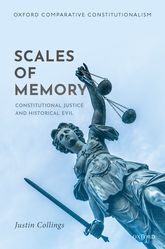BYU Law School is hosting a virtual book launch event today for Professor Justin Collings’ new book, Scales of Memory: Constitutional Justice and Historical Evil, published by Oxford University Press. According to OUP, the book:
- “Explores how the constitutional courts in the United States, Germany, and South Africa have invoked slavery, Nazism, and apartheid – three historical evils – as an aid in constitutional interpretation
- “Argues that courts tend to approach historic evil through one of two principal modes of memory: the redemptive mode and the parenthetical mode
- “Examines how the memory of evil pasts moulds constitutional meaning in the contested present.”

It sounds fascinating. We have a print copy in the library and an ebook copy in Oxford Scholarship Online.
It got me thinking about researching comparative constitutional law. What is comparative constitutional law? Comparative constitutional law is the study of constitution making, structure, and interpretation across the globe. It examines how constitutions deal with issues of human rights, democracy, federalism, and national identity and considers political and social movements.
It is an interesting field but difficult for law students to engage in simply because it is so large and students’ time so limited. Nevertheless, law students can write great papers on comparative constitutional law provided they budget enough time for the research and reading and choose a narrow topic. Here are some research tools that can help:
Methodology and Background
- Oxford Handbook of Comparative Constitutional Law (2012): This Handbook outlines the history and methodology of comparative constitutional law, discusses specific rights and institutions within the framework of comparative constitutional law, and analyzes trends in the discipline. Reviewing a couple of relevant chapters in the Handbook can provide a grounding in the framework of the discipline.
- International Encyclopedia of Comparative Law Online: This Encyclopedia focuses on private law, but Volume II: The Legal Systems of the World/Their Comparison and Unification is useful for studying how different parts of the world view and approach the law.
- Elgar Encyclopedia of Comparative Law, Second Edition: Chapter 18 covers Constitutional Law. Other chapters cover specific nations, methodology, and specific legal concepts.
Scholarship
- Comparative Constitutional Law: Elgar Research Reviews in Law (2017): Written by respected scholar Mark Tushnet, this book covers the most important scholarship from comparative constitutional law through 2016. This is a great place to begin finding scholarship on your topic.
- Max Planck Encyclopedia of Comparative Constitutional Law: Contains 258 articles (and growing) on comparative constitutional law topics. Highly recommended.
World Constitutions
- Oxford Constitutions of the World: English translations of all constitutions from throughout the world plus historical versions and commentary.
- World Constitutions Illustrated (HeinOnline): Current constitutions for every country with English translations (multiple versions of translations when available for comparison), plus constitutional histories and thousands of articles and books.
Historical Perspectives
- Making of Modern Law: Foreign, Comparative, and International Law, 1600-1926: This database has digital copies of old books and treatises on comparative law. Comparative constitutional law has really taken off in the past couple of decades, but going back in time to earlier scholarship can provide a useful perspective. Try John William Burgess’s treatise Political Science and Comparative Constitutional Law from 1893.